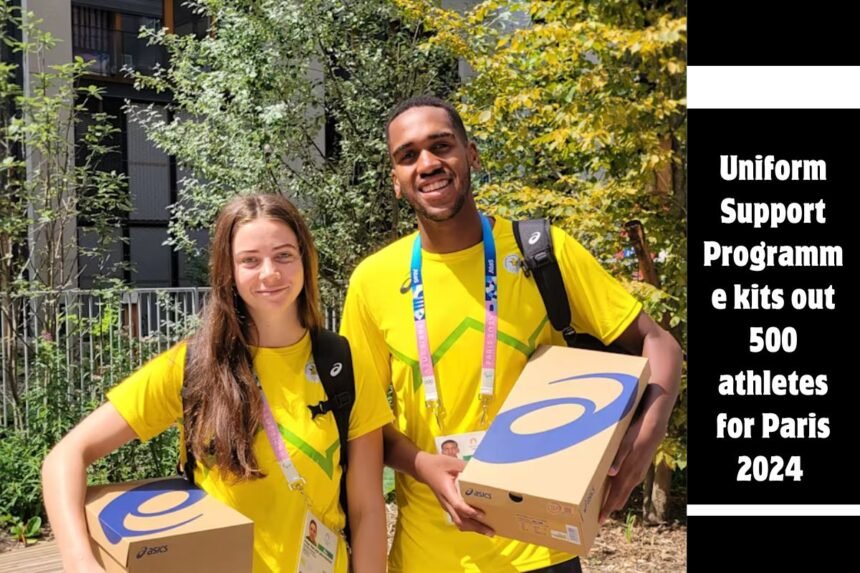Uniform Support Programme kits out 500 athletes for Paris 2024:-We are pleased to announce that over five hundred athletes from all around the world have been provided with cutting-edge uniforms that will enable them to perform to the best of their abilities in Paris. This has been made possible by a collaborative effort between the International Olympic Committee (IOC) and the World Federation of the Sporting Goods Industry (WFSGI), which has been providing assistance to athletes ever since Rio 2016.
Paris athletes get kitted out
When they are competing, every athlete should feel as good as they possibly can. When you are feeling better, you are able to perform better. At the Olympic Games, which are frequently considered to be the most significant competition of an athlete’s career, this is of even more significance.
When it comes to feeling prepared to compete, having the appropriate equipment is a significant factor; nevertheless, not all athletes have access to the apparel that is required. As a solution to this problem, the International Olympic Committee (IOC) and the World Federation of Sports Officials (WFSGI) established the National Olympic Committee (NOC) Uniform Support Programme. This program offers important and free competition attire to Olympic athletes who have the greatest need for it.
Since Sunday 21 July, more than 500 athletes from all over the world have been receiving uniforms that have been made specifically for them, with the tailoring process sometimes starting 18 months out from the Games.
Created by 15 leading sporting goods brands and proudly bearing the corresponding NOC name, emblem and colours, this apparel ensures that every Olympian is on an equal footing when it comes to clothing.
“I’m so grateful to have the opportunity to wear this amazing kit,” says swimmer Paige van der Westhuizen, who will be representing Zimbabwe in the women’s 100m freestyle. “It means a lot and shows that this is another level to other events. I feel honoured and privileged.”
Paige’s team-mate Denilson Cyprianos, also a swimmer for Zimbabwe, believes his new kit will help him perform at his best on the Olympic stage when he competes in the men’s 200m backstroke.
“It’s definitely going to boost my confidence a little bit,” he explains. “Being comfortable is so important in sport. In comfortable kit you’ll be looking the part and ready to swim fast.”
Paige agrees that the new kit will have a positive effect on her performance in the pool.
“It definitely impacts my swimming,” she says. “It helps having the best equipment, and, mentally, feeling good and looking the same as all the athletes gives you confidence when you’re racing.”
Also receiving new gear for Paris is Fe’ofa’aki Epenisa, who is set to become the first-ever female boxer from Tonga to compete at the Olympic Games.
“It makes me feel really supported. I was actually going to compete in my old training shoes, which are worn out,” reveals “Aki”, as she prepares for the women’s 60kg event. “Now, I’ll be walking in feeling and looking good.”
Other post
Gymnast Simone Biles chases her first Paris Olympic gold
Levelling the playing field
The National Olympic Committee (NOC) Uniform Support Programme was initially developed for the Rio 2016 Olympic Games with the purpose of addressing the requirements of some NOCs to supply their athletes with proper clothes for competition. Since that time, the program has been implemented for four additional Games, both summer and winter, and it has provided gear that meets Olympic standards to over 1,500 competitors from 94 different national Olympic Committees located on five different continents.
The statement made by Paige is that “programs like this are really important.” “There are a lot of countries that do not have the resources to provide this for their athletes, so the fact that they are given the opportunity to compete on the same level as the larger teams is incredible.”
The influence of the program, according to Denilson, extends beyond the Games and has the potential to motivate future athletes from Zimbabwe to compete in the Olympics.
In his explanation, he says, “There are times when we are a little bit behind, and the efforts that are made to push you forward really motivate you.” “And not just you, but also the children who are younger than you who will be the athletes of the next generation.”
